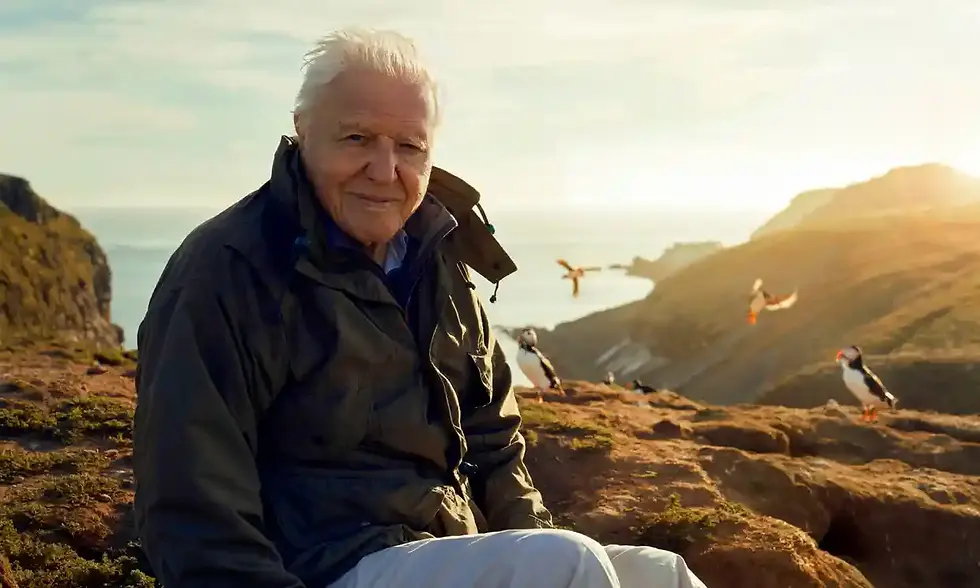Plans to film veteran broadcaster close to birds for Wild Isles series pulled over concerns about his health

Sir David Attenborough filming Wild Isles on Skomer Island – likely to be his last job on location. Photograph: Alex Board/PA
Television producers feared David Attenborough would catch bird flu and die during filming for his latest series – likely to be the veteran broadcaster’s last job on location.
Wild Isles, which premieres on Sunday, will be Attenborough’s first landmark series on the natural history of Britain and Ireland. Filmed over the course of three years, the five-part series aims to shine a light on the challenges affecting the British Isles and celebrate nature that exists on our doorsteps.
But according to the show’s producer, filming on physically demanding terrain – including on the island of Skomer, off the west coast of Wales – meant plans had to be changed at the last minute to avoid seriously risking the 96-year-old’s health.
“The shearwaters are not great at taking off, so what the warden on the island said is, ‘If you sit David close to the burrows, they will almost certainly climb up his arm on to his head and take off from his head’,” Alastair Fothergill told the Radio Times. “We thought, ‘Wow, that could be TV gold’. That was the plan.”
But it soon transpired that this could have seriously endangered Attenborough. Two weeks before filming was due to start, reports came in that bird flu had hit the neighbouring island of Grassholm, which meant it could also be present on Skomer.
“I have an old friend who’s an expert on infectious diseases and I rang him up for his opinion,” Fothergill added. “He said, ‘Well, bird flu is actually extremely hard to catch, but if he [Attenborough] gets it he will die.”
Last month it was reported that British health officials are preparing plans to deploy lateral flow tests if signs emerge that avian flu has begun to spread from one person to another.
The UK Health Security Agency is also working on blood tests to detect antibodies against the virus and officials will analyse the disease’s genetic mutations to reveal data about the increased risk to human health from avian flu.
The current bird flu epidemic is caused by the H5N1 strain of virus, which originated in intensive poultry farms in Asia and has since spread round the globe, with infected migrating birds playing a pivotal roll in its spread. In Britain, the disease has had a growing impact on wild birds over the past two years with 65 species being infected.
Wild Isles will be Attenborough’s first time in front of the camera on location since The Green Planet, which was filmed four years ago. The preparation for the series was incredible demanding, and Attenborough was even accompanied by a doctor with a defibrillator each time he made the climb up the 68 steep concrete steps from the landing jetty to the top of Skomer Island, Radio Times reported.
The broadcaster got in shape by repeated trips up and down the 22 stairs that connect the hallway with the study at his home in Richmond, Surrey.
In total, the Wild Isles crew filmed in 145 locations and 96 species, which took 1,631 days to film. Other locations Attenborough visited during filming included Old Harry Rocks in Dorset and Richmond Park.
Although his family and insiders have said he is not retiring, he is understood to have stopped travelling internationally.
Speaking to the Observer, Fothergill said Attenborough agreed to narrate Wild Isles from the start and was later approached about presenting it. “We felt he had a unique perspective because of his age, on how the British countryside has changed in his lifetime,” he said.
“He introduces every episode and closes the opening and last episode with very powerful pieces about the fact that, as this is our home, it is our responsibility to try to restore nature.”
